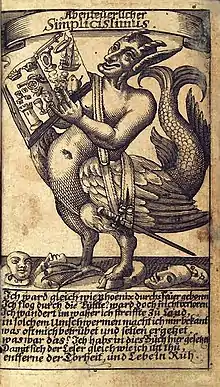Hans Jakob Christoffel von Grimmelshausen | |
|---|---|
 1641 portrait claimed to show Grimmelshausen[2] | |
| Born | 1621 or 1622[3] Gelnhausen, County of Hanau, Holy Roman Empire |
| Died | 17 August 1676 Renchen, Margraviate of Baden, Holy Roman Empire |
| Pen name | German Schleifheim von Sulsfort; various anagrams of his name[lower-alpha 1] |
| Occupation | Writer |
| Language | German |
| Period | Baroque-era Germany |
| Genre | Novel, Allegory, Satire |
| Literary movement | German Baroque |
| Notable works | Simplicius Simplicissimus |
| Spouse | Katharina Henninger |
Hans Jakob Christoffel von Grimmelshausen (1621/22 – 17 August 1676)[3] was a German author. He is best known for his 1669 picaresque novel Simplicius Simplicissimus (German: Der abenteuerliche Simplicissimus) and the accompanying Simplician Scriptures series.
Early life
Grimmelshausen was born at Gelnhausen. At the age of ten, he was kidnapped by Hessian soldiers, and in their midst experienced military life in the Thirty Years' War. In 1639, he became a regular soldier in the Imperial Army. At the latest, in the year 1644 he worked as a writer in a regiment's chancellery—from that year on documents by Hans Jakob Christoffel exist. At the close of the war, Grimmelshausen entered the service of Franz Egon von Fürstenberg, bishop of Strasbourg. In 1665, he was made magistrate (German: Schultheiß) at Renchen in Baden. On obtaining this appointment, he devoted himself to literary pursuits.[4]
Works

Grimmelshausen's work is greatly influenced by previous utopian and travel literature, and the Simplicissimus series attained a readership larger than any other seventeenth-century novel. Formerly, he was credited with Der fliegende Wandersmann nach dem Mond, a translation from Jean Baudoin's L'Homme dans la Lune, itself a translation of Francis Godwin's The Man in the Moone,[5] but recent scholars have disputed this; he did, however, write an appendix to a 1667 edition of that translation, the basis for that association. Der fliegende Wandersman was included in his collected works, though without the appendix.[6]
In 1668, Grimmelshausen published Der abenteuerliche Simplicissimus,[7] which has been called the greatest German novel of the 17th century.[8] For this work he took as his model the picaresque romances of Spain, already to some extent known in Germany. Simplicissimus has been interpreted as its author's autobiography; he begins with the childhood of his hero, and describes the latter's adventures amid the stirring scenes of the Thirty Years' War. The rustic detail with which these pictures are presented makes the book a valuable document of its time. For some, however, the later parts of the book overindulge in allegory, and finally become a Robinson Crusoe story.[4]
The historian Robert Ergang draws upon Gustav Könnecke's Quellen und Forschungen zur Lebensgeschichte Grimmelshausens to assert that "the events related in the novel Simplicissimus could hardly have been autobiographical since [Grimmelshausen] lived a peaceful existence in quiet towns and villages on the fringe of the Black Forest and that the material he incorporated in his work was not taken from actual experience, but was either borrowed from the past, collected from hearsay, or created by a vivid imagination."[9]
Among Grimmelshausen's other works, are the so-called Simplicianische Schriften (German: Simplizianische Schriften):
- Die Ertzbetrügerin and Landstörtzerin Courasche[10] (1670)
- Der seltsame Springinsfeld[11] (1670)
- Das wunderbarliche Vogelnest (1672)
He also published satires, such as Der teutsche Michel[12] (1673), and gallant novels, like Dietwald und Amelinde (1670).
Death and legacy
_7899.jpg.webp)
Grimmelshausen died in Renchen in 1676, where a monument was erected to him in 1879.[3]
His Landstörtzerin Courasche became an inspiration for Bertolt Brecht's play Mother Courage and Her Children.[13][14]
Der abenteuerliche Simplicissimus lent its name to Simplicissimus, a satirical German weekly which ran from 1894 to 1944 and 1954 to 1967.
Notes
- ↑ List of pseudonyms attributed (as anagrams) to Grimmelshausen:
Samuel Greiffensohn von Hirschfeld
German Schleifheim von Sulsfort
Melchior Sternfels von Fugshaim
Philarchus Grossus von Trommenheim
Michael Rechulin von Sehmsdorf
Eric Steinfels von Grufenshohn
Simon Lengfrisch von Hartenfels
Israel Fromschmid von Hugenfels[lower-alpha 2] - "Anagramme Grimmelshausens" (in German). Grimmelshausenfreunde Renchen e.V. Retrieved 17 November 2019.
References
- Krause, Tilman; Baier, Ute (24 June 2005). "Rätselhafter junger Mann" [Mysterious young man]. Die Welt (in German). Retrieved 15 November 2019.
- ↑ Krause, Tilman; Baier, Ute (24 June 2005). "Rätselhafter junger Mann" [Mysterious young man]. Die Welt (in German). Retrieved 15 November 2019.
- 1 2 3 "Grimmelshausen, Hans Jacob Christoph von". Encyclopædia Britannica. 13 August 2018. Retrieved 17 October 2018.
- 1 2 One or more of the preceding sentences incorporates text from a publication now in the public domain: Chisholm, Hugh, ed. (1911). "Grimmelshausen, Hans Jakob Christoffel von". Encyclopædia Britannica. Vol. 12 (11th ed.). Cambridge University Press. p. 603.
- ↑ Hennig, John (1945). "Simplicius Simplicissimus's British Relations". Modern Language Review. 40 (1): 37–45. doi:10.2307/3717748. JSTOR 3717748.
- ↑ Bürger, Thomas; Schmidt-Glintzer, Helwig (1993). Der Fliegende Wandersmann nach dem Mond: Faksimiledruck der deutschen Übersetzung (in German). Wolfenbüttel: Herzog August Bibliothek (published 1995). ISBN 978-3-88373-074-5.
- ↑ Grimmelshausen, H. J. Chr. (1669). Der abentheurliche Simplicissimus [The adventurous Simplicissimus] (in German). Nuremberg: J. Fillion. OCLC 22567416.
- ↑ Moore, Steven (2013). Novel: An Alternative History, 1600–1800. New York: Bloomsbury. p. 61. ISBN 978-1441188694.
- ↑ Ergang, Robert H. (1956). The Myth of the All-Destructive Fury of the Thirty Years' War. Pocono Pines, PA: The Craftsmen. OCLC 905630683.
- ↑ Grimmelshausen, H. J. Chr. (1670). Trutz Simplex: Die Ertzbetrügerin und Landstörtzerin Courasche [Simple's defense: The arch-fraud and pauper Courage] (in German). Nuremberg: W. E. Felssecker. OCLC 248092792.
- ↑ Grimmelshausen, H. J. Chr. (1670). Der seltzame Springinsfeld [The strange Jump-into-the-field] (in German). Nuremberg: W. E. Felssecker. OCLC 79549164.
- ↑ Grimmelshausen, H. J. Chr. (1673). Simplicissimi Pralerey und Gepräng mit seinem Teutschen Michel [Simplicissimus' boast and talk with his German Michel] (in German). Nuremberg.
- ↑ Harold Bloom (2009). Bertolt Brecht: Comprehensive Research and Study Guide. Infobase Publishing. p. 28. ISBN 978-1-4381-1639-6.
- ↑ G. Ronald Murphy (2010). Gemstone of Paradise: The Holy Grail in Wolfram's Parzival. Oxford University Press. p. 203. ISBN 978-0-19-974759-7.
Further reading
- Arthur F. J. Remy (1913). . In Herbermann, Charles (ed.). Catholic Encyclopedia. New York: Robert Appleton Company.
- . Encyclopedia Americana. 1920.
- Antoine, Ferdinand (1882). Étude sur le Simplicissimus de Grimmelshausen [Study about Grimmelshausen's Simplicissimus] (Thesis) (in French). Paris: Klincksieck. OCLC 15378464.
- Grimmelshausen, Hans Jacob Christoffel von (1986) [1669]. An unabridged translation of Simplicius simplicissimus. Translated by Adair, Monte Frederick. Lanham, MD: University Press of America. ISBN 9780819153487.
- Grimmelshausen, Hans Jacob Christoffel von (2011) [1670]. Courage - The vindictive tramp. Translated by Adair, Monte Frederick. Magdeburg: Copy Team. ISBN 9783941170674.
- Grimmelshausen, Hans Jacob Christoffel von (2012) [1670]. The Elusive Springinsfeld. Translated by Adair, Monte Frederick. Magdeburg: Copy Team. ISBN 9783941170667.
- Grimmelshausen, Hans Jacob Christoffel von (1882) [1669]. Der Abenteuerliche Simplicissimus (in German). Vol. 1. Berlin und Stuttgart: W. Spemann.
- Grimmelshausen, Hans Jacob Christoffel von (1882) [1669]. Der Abenteuerliche Simplicissimus (in German). Vol. 2. Berlin und Stuttgart: W. Spemann.
- Grimmelshausen, Hans Jacob Christoffel von (1912) [1669]. Simplicius Simplicissimus. Translated by Goodrick, Arthur Thomas Scrope. London: Wiliam Heinemann.
- Grimmelshausen, Hans Jacob Christoffel von (1975) [1669]. Der Abentheurliche Simplicissimus Teutsch (in German). München: dtv. ISBN 3538050988.
External links
- Works by Hans Jakob Christoffel von Grimmelshausen at Project Gutenberg
- Works by or about Hans Jakob Christoffel von Grimmelshausen at Internet Archive
- Works by Hans Jakob Christoffel von Grimmelshausen at LibriVox (public domain audiobooks)

- Author page for Grimmelshausen on Projekt Gutenberg-DE